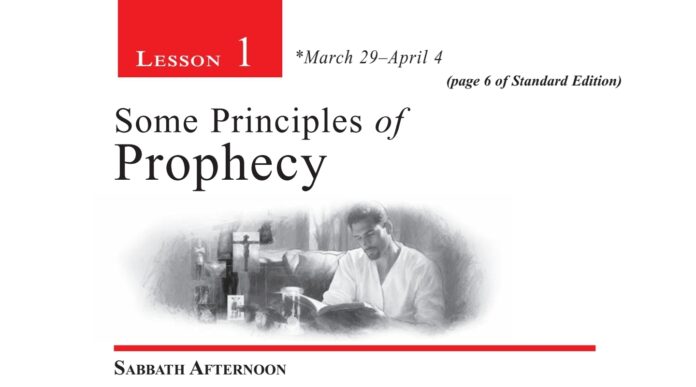SECOND QUARTER 2025: ALLUSIONS, IMAGES, SYMBOLS: HOW TO STUDY BIBLE PROPHECY
Lesson ONE : SOME PRINCIPLES OF PROPHECY
Introduction: As Seventh-day Adventists, we view prophesies through the lens of the great contoversy between Christ and Satan. As we seek to understand the prophecies found in the Bible, the ten reading principles include how a text should be read candidly, carefully, aesthetically, contextually, intertextually, spiritually, intelligently, corporately, existentially and ethically.
Memory Text: Jeremiah 9:24 (NKJV)
“But let him who glories glory in this, That he understands and knows Me, That I am the Lord, exercising lovingkindness, judgment, and righteousness in the earth. For in these I delight,” says the Lord.”
SABBATH; Christians often disagree about prophecy and consider it invalid because some Bible books such as Revelation seem incomprehensible, backed by the fact that some pastors think that studying prophecy creates more problems than it solves. However, given the fact that most Christians that lived before 1800 were comfortable with Bible prophesy and often agreed with each other as far as prophetic interpretations are concerned, God still intends that you and I, at present, still understand His Word without divisions among us.
(READ 1 Corinthians 1:10)
SUNDAY: Many people, including students in various universities, study the Bible as a basic textbook and so do the professors that lead through those kind of lectures and they find the truth found there in as laughable. This is so because those who regard the Bible this way read it without full surrender to God with humble hearts ready to learn the truths revealed in the Bible. However, the right tools being the right attitude and the Holy Spirit are what helps one to understand God and His character as revealed in His Word because it is His utmost desire that we understand Him.
(READ Matthew 11:29; 24:15; Revelation 1:3; Jeremiah 9:23&24)
MONDAY: The limitations involved in understanding who God is in His word, is not derived from a lack of His vocabulary to communicate to us, but rather is derived from our limitations in understanding His vocabulary, however much He would like to communicate to us. We can never fully understand God, however, we can understand that, which we need for our Salvation, whose plan is illustrated through fulfilled prophesies in the past. The same Salvation is attained through Jesus Christ who shows how loving God is, and it is God’s desire that this gift of Salvation stretches to every individual.
(READ Isaiah 55:9; Psalms 139:1-6; 147:5; Romans 11:33; 1 John 3:20; 2 Timothy 3:14&15)
TUESDAY: The words told to Prophet Daniel mean that the words of that book would be understood in the near future, whereas the words spoken to John the Revelator mean that the words there in were meant to be understood from the first since the time was at hand. The birth of the Remnant Church and a clear understanding of the three angels’ message further more proves the fulfilment of Daniel’s prediction about the increase in knowledge of the book of Daniel in the last days.
(READ Daniel 12:4; Revelation 22:10)
WEDNESDAY: William Miller played a crucial role in helping us understand most of the Bible prophecy. Unlike having a few pieces that help one figure out what a whole puzzle could be about, the Bible prophecies are not well understood only by selecting a few texts on a particular topic so as to come up with a correct analysis and interpretation of events. Rather, one is encouraged to consider all the Bible texts that talk about that particular text and use the bigger context of that Scripture to interpret what the Bible says.
(READ Matthew 5:18; 2 Timothy 3:15-17; Luke 24:27)
THURSDAY: One important way of figuring out what a symbol in the Bible in regards to prophesy interpretations is, is by finding out first how that symbol is used all through the Bible, and not necessarily applying the meaning of the symbol as used in this present world. We should allow the Bible to interpret itself because it does so. Furthermore, we see that God uses prophetic symbols during His communication to us in His word for purposes of reducing persection of His people because the message is not brought forth bodly. However, we are called upon to trust what God wants us to understand through the symbols and their meanings.
(READ Daniel 7;7, 24; 8:3; Revelation 1:16; 12:1&2; 21:2 Ephesians 5:31; 6:17; Hebrews 4:12; Jeremiah 6:2)
FRIDAY: In as much as people declare Daniel and Revelation’s mysteries as incomprehensible, Jesus referred to and used the words in Daniel when He told whosoever reads to understand, when He spoke to His disciples. In addition, the book of Revelation is revelation of Jesus Christ and this is evidence enough that God wishes us to understand the words in that prophetic book too. The words in these prophetic books are instructions from God to men regarding the unfolding of final events on earth, and are messages as well that are to ripen the harvest of the earth and to bring people from darkeness into light.
(READ “An American Reformer” pp.319-324 in The Great Controversy by Ellen G White)
CAPTIONS:
SUNDAY; Whoever reads, let him understand
MONDAY; God wants to be understood
TUESDAY; Daniel-shut up the words
WEDNESDAY; Studying the Word
THURSDAY; Figurative or Literal?
FRIDAY; Further thought
DISCUSSION QUESTIONS:
1. Someone not known to be pious was found reading the Bible. When asked what he was doing, he responded, “Looking for loopholes. Looking for loophopes.” Why is that exactly the wrong attitude to have when reading God’s Word?
2. Even if some symbols and prophecies remain mysteries, how can focusing on what we do understand strengthen our faith?
3. What are the best ways to protect ourselves from the many wild and speculative attempts to interpret prophecies, sometimes even from those within our own church? Why must we be careful to “test all things; hold fast what is good”(1 Thessalonians 5:21, NKJV)?



